In the summer of 1892, the job of readying the fairgrounds of the World’s Columbian Exposition for its official dedication in October and then finishing work in time for the May 1, 1893, opening must have seemed an impossible task. Luckily, the magical Brownies were there to “lend a helping hand.”
The Brownies are a band of adventurous and mischievous little characters created by writer and illustrator Palmer Cox (1840–1924) and based on Scottish folklore figures. Cox wrote that his Brownies, “like fairies and goblins, are imaginary little sprites, who are supposed to delight in harmless pranks and helpful deeds. They work and sport while weary households sleep, and never allow themselves to be seen by mortal eyes.”
The delightful creatures’ first story, “The Brownie’s Ride,” appeared in the February 1883 issue of St. Nicholas Magazine. With soaring popularity, Cox made the Brownies one of the earliest cartoon characters used in mass merchandising. Their whimsical adventures eventually filled a series of books.
A “Brownies Through the Year” series, in which the title characters visited various sites in the United States, ran in The Ladies’ Home Journal each month in 1892, and was collected in The Brownies at Home by Palmer Cox (Century Co., 1893).
For the September 1892 installment, the Brownies visited the fairgrounds of the World’s Columbian Exposition in Chicago. Reprinted below is “The Brownies in September” from this collection.
We’ll revisit the Brownies sometime soon to explore how they showed up in several Columbian Exposition advertisements and periodicals.
THE BROWNIES IN SEPTEMBER.

silver crescent in the sky,
September’s moon was sailing high,
In eighteen hundred and ninety-two,
When Brownies met to carry through
An enterprise they had in view.
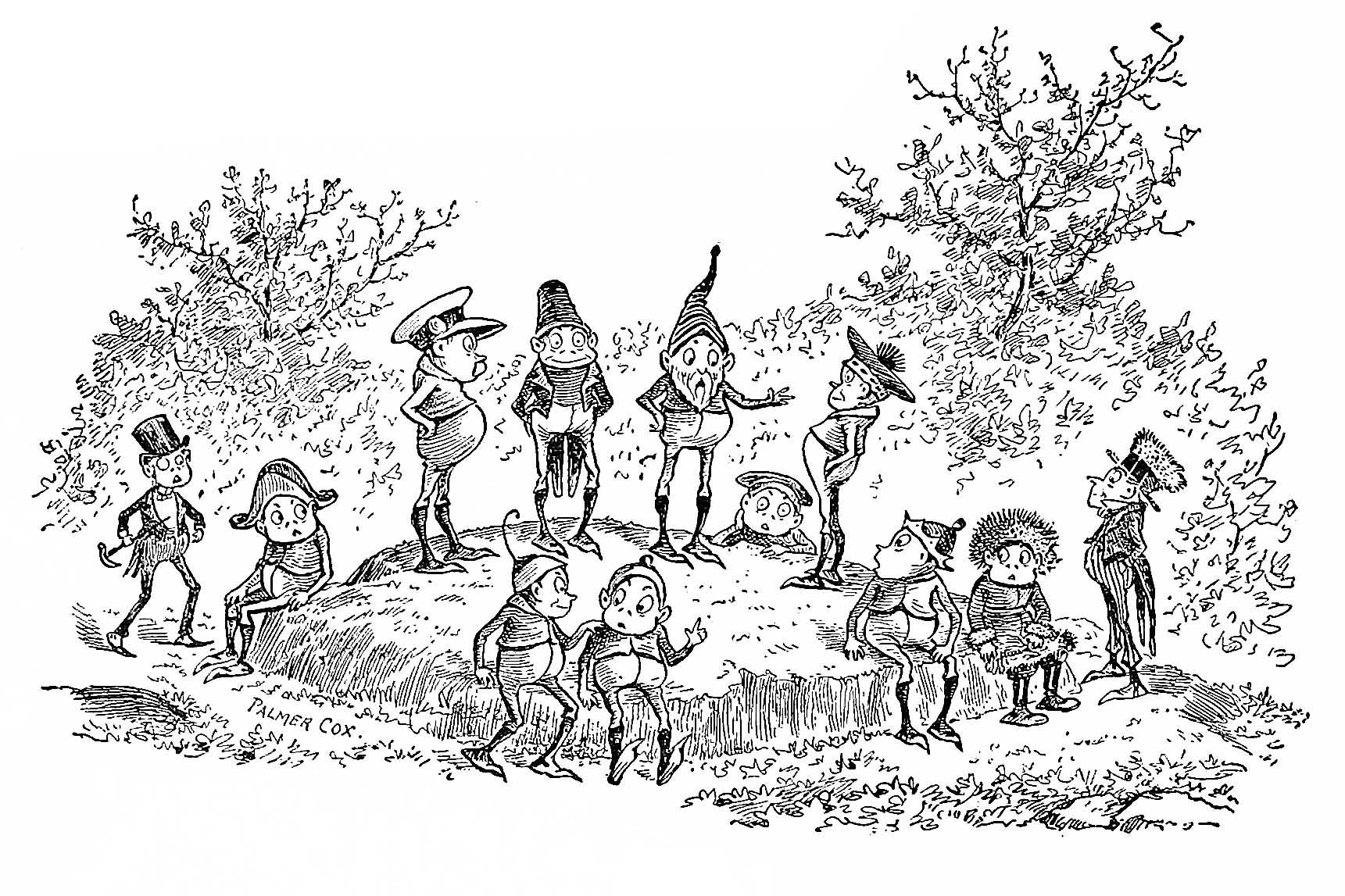
Said one: “We soon, as you’re aware,
Will have the great Columbian Fair,
When banners will to winds be spread,
And speeches made, a poem be read,
And voices mingle, rich and strong,
In rendering anthems loud and long.”

Another said: “Then I’m afraid,
Unless we give some mystic aid
In pushing workers who are slow,
They’ll not be ready for the show.”
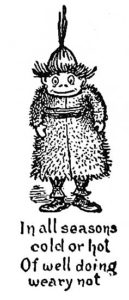
A third remarked: “No better way
Can we our loyalty display
Than here to lend a helping hand
In finishing these buildings grand
That ornament this spacious ground.
‘T will to the country’s good redound,
And spare the blush that else might speak
Of shame on fair Columbia’s cheek.”
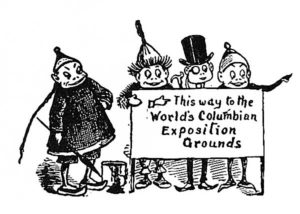
 This was enough to start the band,
This was enough to start the band,
And soon the work was closely scanned,
To see where they could lay a floor.
Put in a sash, or hang a door,
Or even on the rafters strong
Make bold to help the work along.
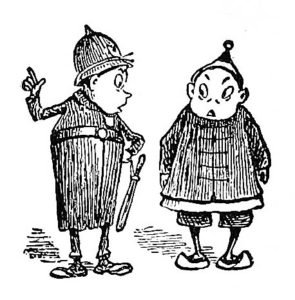
Now columns tall they climbed to get
A closer look at what was set
Upon the top, with wings outspread,
A staff in hand, or wreath on head.
On counting them the Brownies found
Just thirteen columns standing round.
Said one: “No doubt the sculptor meant
The early States to represent,
And give a lesson gratis here,
As well as ornament the pier.”
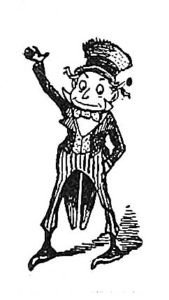
The Woman’s Building drew their eyes,
But they beheld the same with sighs,
Because the topmost tile was laid.
And left no chance for Brownie aid.
But other buildings of the Fair
Could take some touches here and there;
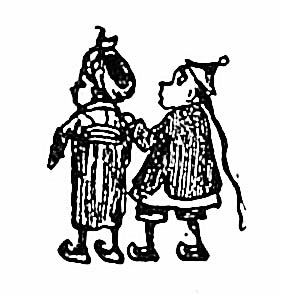
So off the Brownies ran for tools,
For paint-pots, hammers, saws, and rules.
That weary workmen quickly threw
Aside when evening whistles blew.
Said one: “The brush is suited well
For Brownie hands, the truth to tell;
As for myself, no more I ask
Than elbow-room at such a task.
And I’ll not be the last to mount
A ladder, and to some account.
For I will never be behind
In spreading paint, keep that in mind.
It may be red, or green, or blue.
Or yellow, or another hue.
It matters not, my work shall go
As fast as any one’s, I know.”
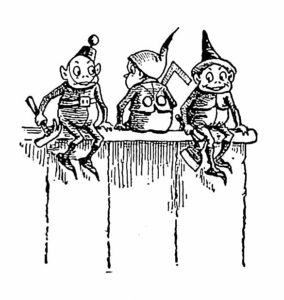
Another said: “Our skill we’ll try
Upon this dome-capped building nigh.
Some others here a stir can make
With brushes, or I much mistake,
And honors will not all descend
On one alone, you may depend.
Each Brownie here must do his part;
No shrinking hand or timid heart
Will serve as an excuse to-night,
Or make a member’s labor light.”
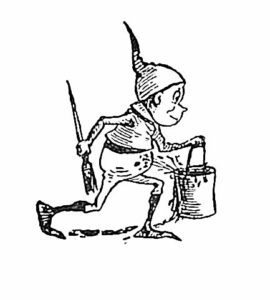
Then work began without delay.
Though plenty there had more to say,
And could have talked and argued still
About their gifts or special skill;
But Brownies, when there’s work to do,
That must ere dawn be hurried through,
Are eager to improve each hour
And work with all their skill and power.
Each took the tool that suited best
His turn of mind, for all were blessed
With skill that made them handle well
Whatever to their portion fell;
Then climbing here and mounting there,
Each loyal Brownie did his share.
All clearly showing from the start
They had the nation’s good at heart.
Some, spreading brown paint, moved ahead,
More followed with a coat of red;
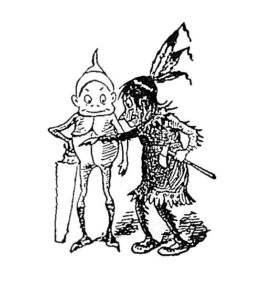
Then quickly, ere the first had dried,
Still other colors were applied.
Said one: “Though not apprenticed out
To masters hard, and knocked about,
To learn a trade ‘twixt kick and blow
That often with instruction go,
We ‘re not so far behind mankind
At putting things in shape, they’ll find;
For we can saw and paint and bore,
And, better still, do some things more
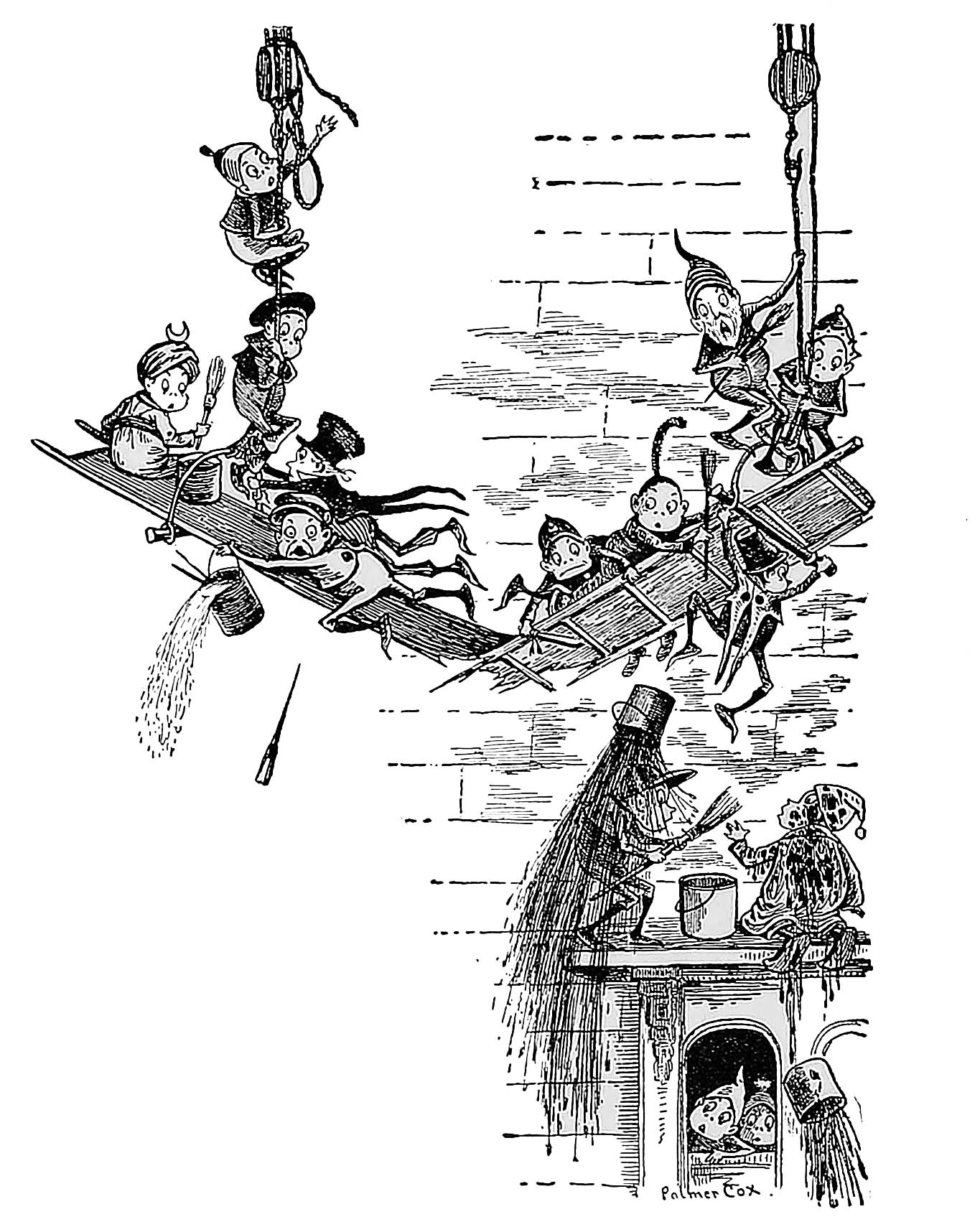
In mystic ways, by Brownie rides.
That are unknown to human schools.
It may seem odd, indeed, to smother
One coat so quickly with another.
But we from men no lessons take.
Nor ask advice; but simply make
Our time and task on hand agree,
And keep from complications free.
The morning sun might raise his head
Before one half om- paint was spread,
If we should work as if afraid
Of new departures in the trade.
The paint is there, it matters not
If mixed on wall, or mixed in pot,
And what the Brownies spread about
Will last until the wood gives out.”
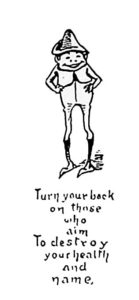
Some sad mishaps disturbed a few.
And gave their clothes a foreign hue;
Before the task was well in hand
They formed a queer, bespattered band—
Some red as robins when they tune
Their voices sweet in sunny June;
Some green as Erin’s banner old
When on St. Patrick’s day unrolled;
More, like canaries from the Isles,
Awakened many jokes and smiles.
The coat that Joseph left behind,
When to the pit he was consigned.
Showed not more colors to the sun
Than Brownie garb when they were done.
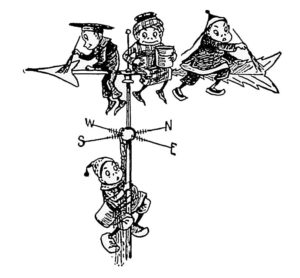
Though hurried greatly at the last,
As morning light was creeping fast,
The very vane that told the way
The wind was blowing, night and day,
Received a touch from Brownies bold
Until it looked like burnished gold.
The Brownies made themselves at home;
They clambered over roof and dome,
They set the glass and tacked the slate
And tin on towers tall and straight,
And nailed the ornaments in place
That to the buildings added grace.
The highest point or peak about
The structure grand they hunted out;
‘T was there they wished their skill to show,
‘T was there they plied the willing blow,
And swung their flimsy scaffolds height.
Regardless of the giddy height.
No brains of weak, unhealthy tone
To dizzy grow the Brownies own;
While hands have strength, and toes are sure,
The head has faith and feels secure.
So up they go and never reel,
Although the clouds around them wheel.
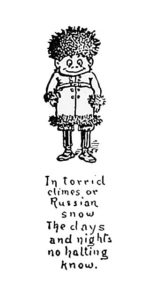
No wonder, then, the work that night
With magic speed was set aright
No wonder, then, the workmen stared
When to their stations they repaired.
They found their work had jumped ahead
While they were fast asleep in bed!
They would have struck for higher pay
If they had longer time to stay.
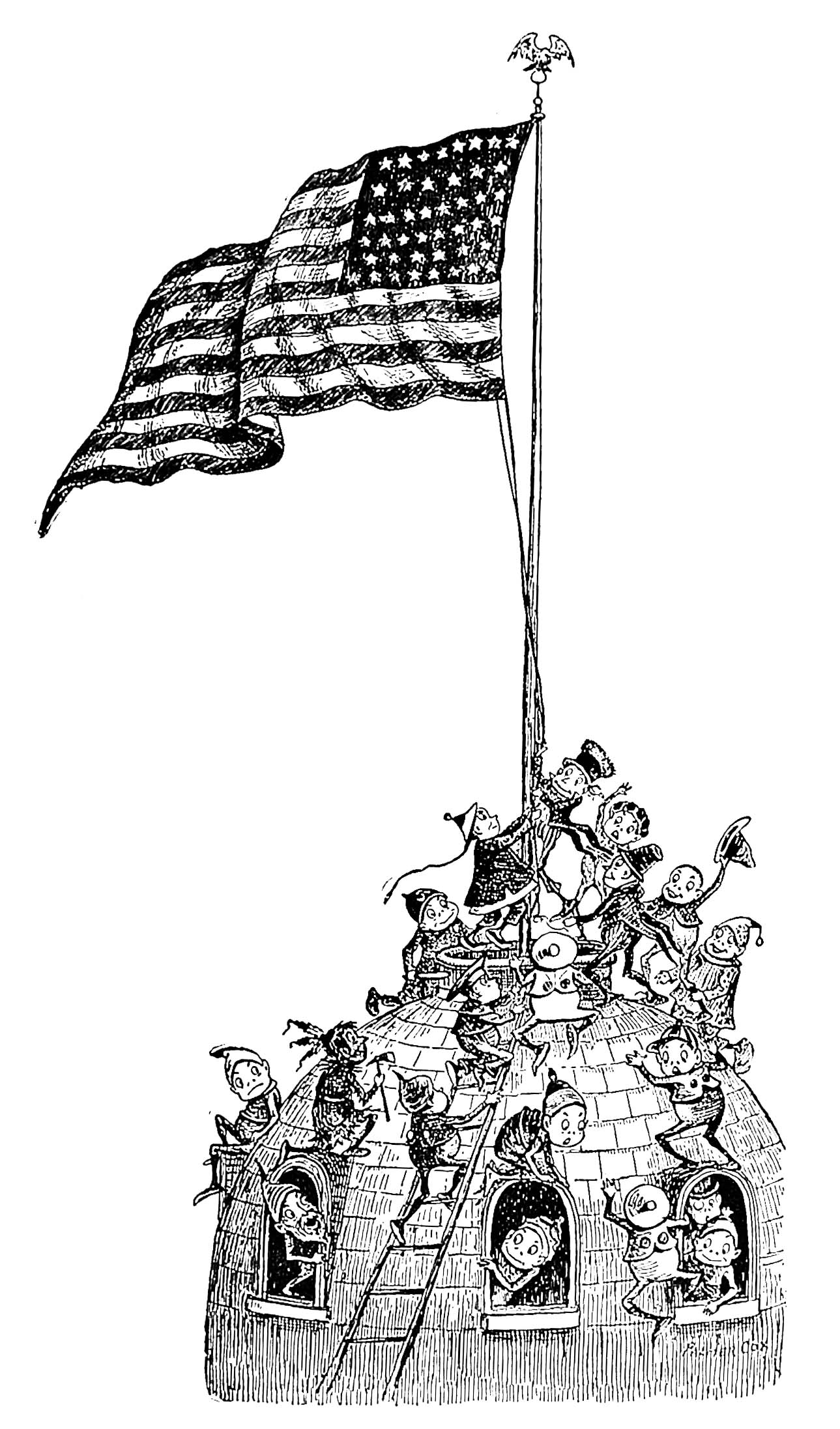
Now from some place, where, as they thought.
Such things were kept, the Brownies brought
A brand-new flag, with stripes of white
Alternate set with crimson bright;
While many stars, in order due,
One comer filled on field of blue.
A mammoth flag,—I cannot name
The yards of bunting in the same;
But safe it is for me to say
‘T would draw the eye ten miles away,
And let one know, beyond a doubt,
What nation hung the emblem out.
It mattered not how large of size,
The Brownie band had found a prize;
And now it did their fancy please
To give the symbol to the breeze.
The wind that from the lake was strong
Played freely with the colors long,
And wrapped the Brownies in its fold;
But still they worked nor lost their hold,
While up it ran; ‘mid joyful cries,
Above the grounds it proudly flies!
Said one: “We’ll leave it floating there,
Through blizzard, storm, or milder air,
To let the folks who reach these shores,
From every nation out of doors,
Learn how it feels to draw at last
One breath of freedom from the blast;
Here they may hear our eagle scream,
Learn liberty is not a dream,
And stand beside this inland sea.
Beneath the banner of the free!
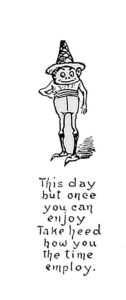
As centuries shall roll away
The people will all honor pay
With special zeal to Ninety-two,
And tell the great exploit anew
When, in despite of plot or plea,
Columbus steered his vessels three
To find the unknown region here,
Respected now both far and near.”
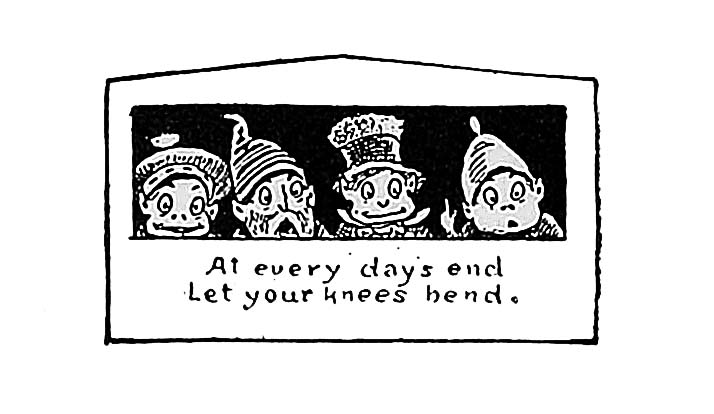
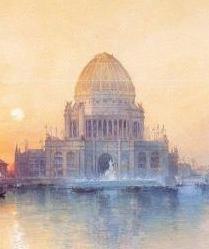
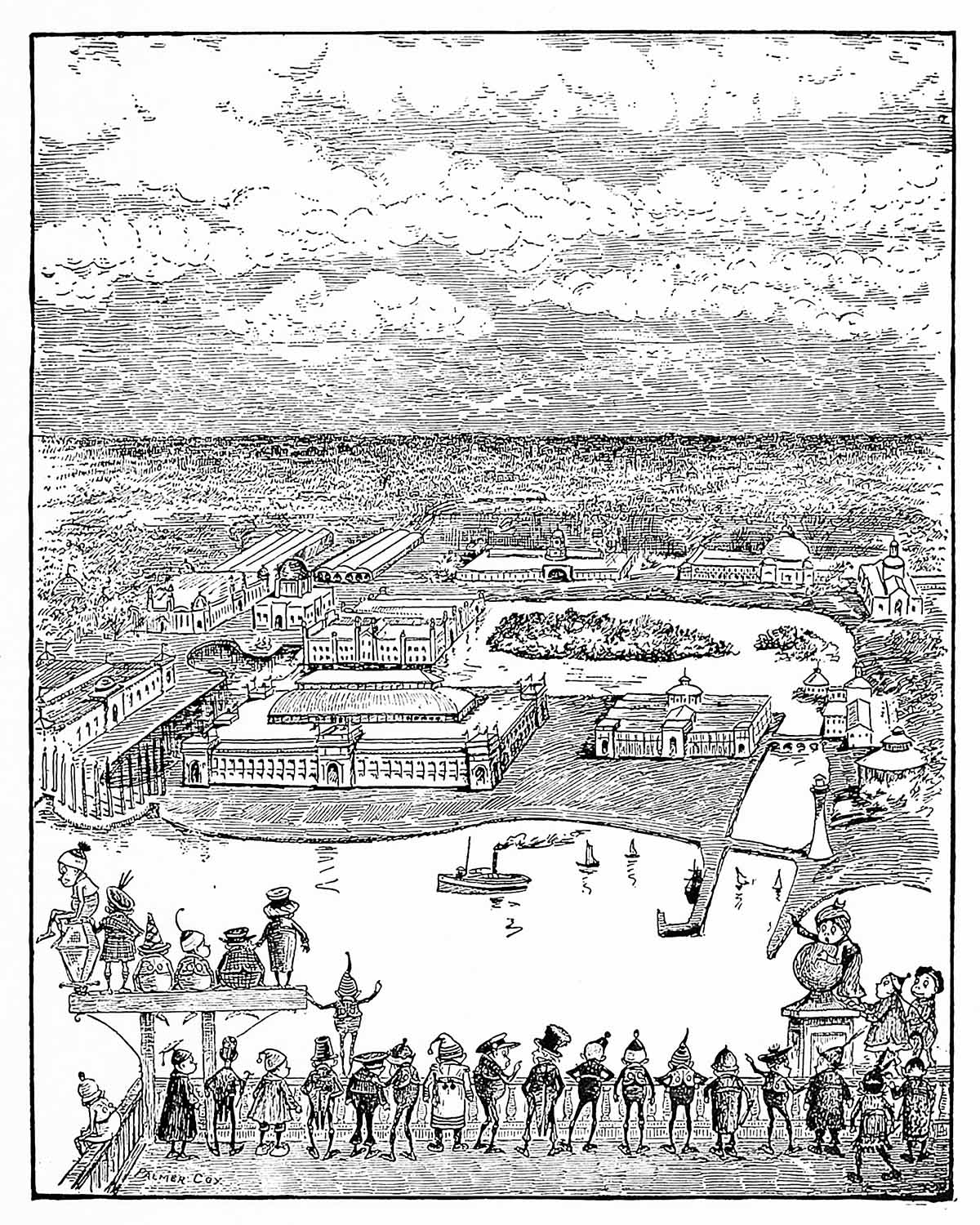
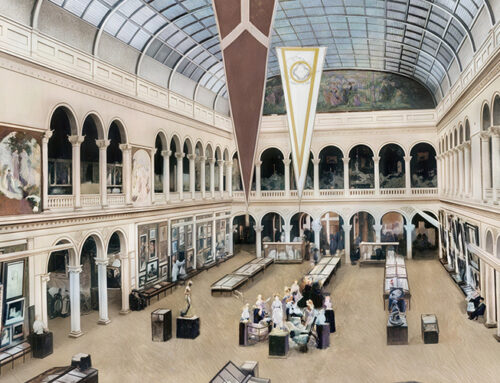
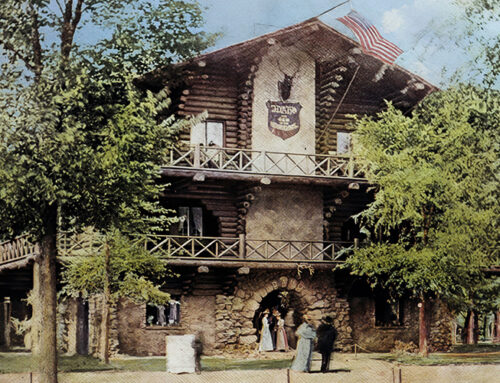
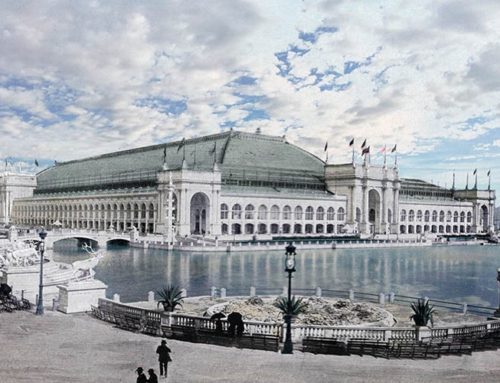
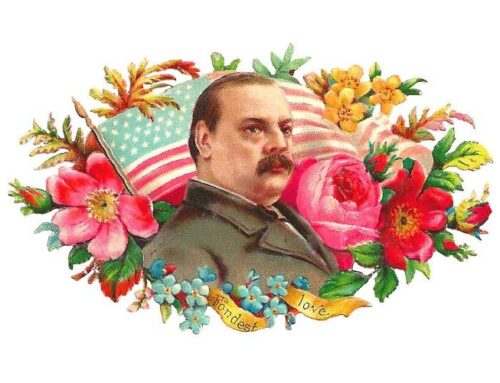
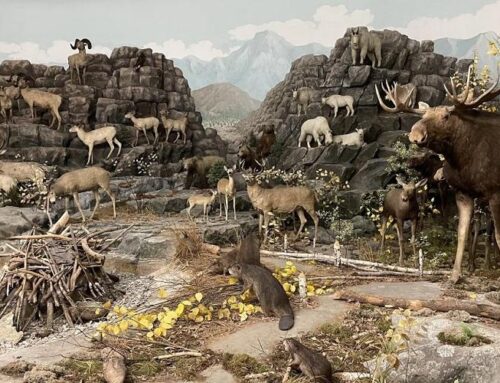
Leave A Comment